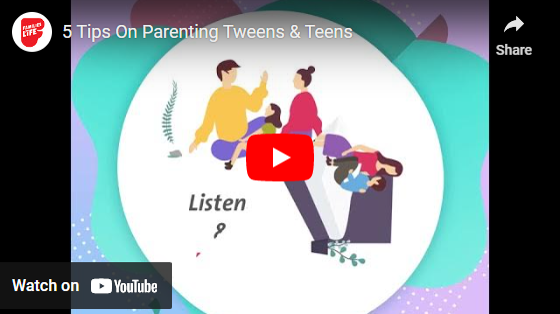Families For Life | When Tweens become Teens
The transition from pre-teen to teenage years typically happens anytime between the ages of 8 and 12. If you are going through these changes, you probably feel that this can be a challenging and tumultuous time.
The video below shares 5 tips on parenting tweens and teens.
Handling Change
Not only will you face changes in your social life, you may also face changes in your own body due to puberty. The growth of pubic hair, development of acne and muscles or lack thereof can give rise to uncertainties, self-esteem issues, and fear of ridicule. As a result of these stressors, most adolescents may face mood changes, insecurities, and increased self-consciousness. Some may even show fluctuations between behaving like an adult and a child.
Also, you may find yourself slowly inching towards greater independence. Issues such as greater peer pressure, anxiety, first-time experiences with boy-girl relationships, and the importance of doing well academically may also get to you. Moral development also begins, where you start learning how to make your own decisions and realising the consequences of those actions. For a young teenager, it can be all very exciting and intimidating at the same time!
Staying Connected
In the midst of figuring out your identity, it is inevitable that you may try to distance yourself from your parents and leave them out of important aspects of your life. However, do understand that your parents may become sensitive and feel left out when you shut them out. Ultimately, they care about and are concerned with how you are doing, and you should make an effort to strike a right balance. Ask for the space you desire, but at the same time, allow your parents to step in when the situation calls for it. They have rich experience and can provide the guidance and advice you need.
How can you stay connected to your parents and go through this period together without appearing too aloof? There are a few ways:
Make Time
You can set aside some time over the weekend to spend with your family. Make arrangements to ensure this bonding opportunity is achieved as it is important. The time spent together can revolve around an activity that everyone enjoys and finds fun in. This way, everyone will appreciate the moments and fruitful exchanges are more likely to be shared.
Share
Being ready to share some details of your life is also important. Try to have open conversations in which judgments and harsh criticisms are withheld. Common interests, hobbies, and favourite recreational activities can be used as starting points for open-ended conversation. Remember that being genuine and positive will most definitely result in better engagement.
Know That You Are Not Alone
As you journey from your pre-teen to teenage years, keep in mind that you are not alone on this journey. While it may seem scary or tough at times, remember that your parents or older relatives have gone through it and they have turned out alright. Emotional support is important during this period, so do talk to your parents and friends if you feel vulnerable and need a listening ear – they will be more than willing to help you tide through the period.
Key Takeaways:
The pre-teen to teenage period is marked by a need for greater independence and the experience of puberty.
You may face heightened self-consciousness, peer pressure, and insecurity as a result of the transition.
Stay connected to your parents by sharing details of your life, spending time with the family, and reassuring them.
